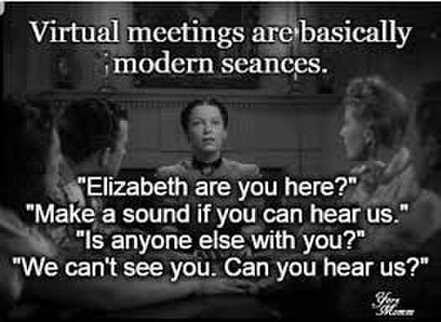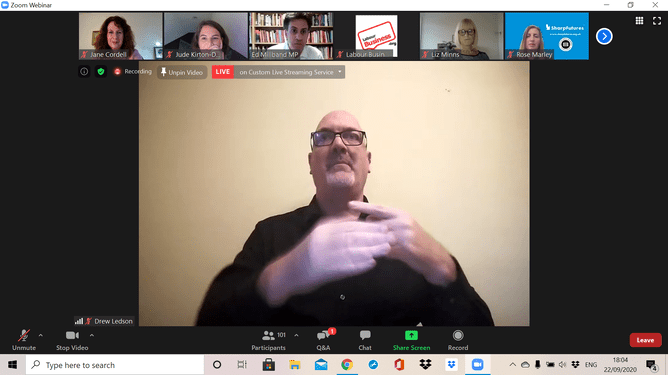Why working online isn’t always the joyous experience it’s cracked up to be.
Imagine a meeting. In a room. With other humans. You know – old school from back in the mists of time – say last year. How would we have felt if people had said:
‘You have frozen.’
‘You sound like a dalek.’
‘Where did you go?’
‘You are melting… You look a bit like the Terminator..’ ?
When seated around a table together for a meeting people didn’t suddenly slide from view under the table (not usually anyway), stop using their voice, go all blurry or pixelated (not unless the meeting coincided with a particularly boozy office party) or start using a voice which sounded like it wanted colleagues to ‘Exterminate’!
Now that we see each other on screens, such comments are almost routine.
This can be at best, disconcerting, but at worst, seriously undermining. When and if people disappeared from meetings, they would usually do so with a quick explanation, a wave of the hand, a smile. Now they are just, well, not there. It is all or nothing with online communication, and the ‘nothing’ – when the connection or the tech fails, can feel very alienating. And when it happens at a crucial moment, it can mean we lose confidence.
There is something not quite right, too, about being able to ‘switch off’ a group of people in a meeting. It’s so abrupt, isn’t it? Am I the only person who, after being ejected from a high-energy meeting, feels ‘What now?’.
If you have been running an online event, the adrenaline flowing (topped up by the constant undertow of worry about whether the tech could fail), when you finish – there is no gradual coming down to earth. There are no gentle chats ‘in the margins’ before you depart. You are just suddenly there, by yourself. It’s like crunching the gears. And it doesn’t suit us as humans.
Running a major training programme in the spring, my colleague and I had to adapt rapidly to this way of working. I use lipspeakers to relay speech and sound. But the (older) online platform we were required to use at that point, and the size of the group, meant that videos had to be switched off. To see what people were saying, I needed to see and lipread the lipspeakers. So we rigged up a separate mobile phone video call and I placed a tablet on our cats’ climbing frame so I could see the lipspeaker and keep glancing at the set of black boxes on the conference call. The lipspeaker skillfully listened to the main call and relayed it to the video on their phone. It was complex. And then ‘meltdown’ happened quite a few times and I ended up peering at a heavily pixelated version of my lovely support worker with a sense of rising panic.
Inside a voice was screaming ‘This won’t work! You cannot do this!’. It was more than mildly terrifying and a definite case of mind over emotions – which thankfully my mind (just about) won, mainly with the support of the colleague.
Sometimes the opposite can happen. In massive webinars, as a participant you are usually not seen or heard. The advantage of this is that you can attend in your PJs or jogging gear and nobody will be the wiser. What if you are one of those exotic creatures like me who needs a human being for support (if we are honest, who doesn’t? deafness or disability makes it harder to conceal that need)? If you are, you may find yourself unexpectedly flung into the limelight. This happened to me recently when joining hundreds of others at a Labour Business event.
Because my support worker needed to be visible, he was placed on the (large) panel. All well and good. But what I had not realised was that as a participant, I would not be able to ‘pin’ the lipspeaker in large format. So I was trying to follow an image the size of a small postage stamp. And it didn’t work. Thanks to the wonderful administrator, Liz Minns' multi-tasking skills, I eventually found myself appearing on the panel – with erm members of the Shadow Cabinet. At least I could tell what they were saying.
I am so glad I hadn’t plonked myself down at the computer in my sweaty old running gear.
Online meetings are far better than no contact at all. And we are adaptable creatures. But we need to figure out friendlier ways of switching our colleagues off and be kinder to ourselves when the technology decides to do it for us. If you have any creative ideas please get in touch.

